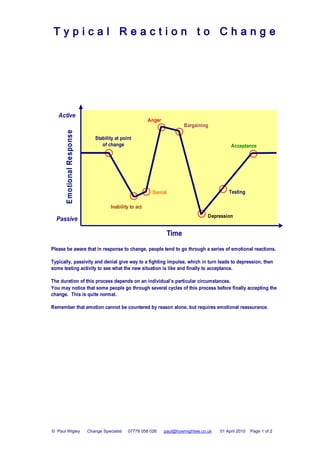
Helping People Deal With Change
- 1. Typical Reaction to Change Active Anger Bargaining Emotional Response Stability at point of change Acceptance Denial Testing Inability to act Depression Passive Time Please be aware that in response to change, people tend to go through a series of emotional reactions. Typically, passivity and denial give way to a fighting impulse, which in turn leads to depression, then some testing activity to see what the new situation is like and finally to acceptance. The duration of this process depends on an individual’s particular circumstances. You may notice that some people go through several cycles of this process before finally accepting the change. This is quite normal. Remember that emotion cannot be countered by reason alone, but requires emotional reassurance. © Paul Wigley Change Specialist 07778 058 026 paul@howmightwe.co.uk 01 April 2010 Page 1 of 2
- 2. Typical Reaction to Change Stages What to look out for How to help Often people confronted with change look a bit Empathize with them. Recognize that some stunned. They may seem a bit ‘frozen’ and could people take longer than others to absorb what well be in shock. If people believe they have no is happening. Help them to start talking about Inability to choice in a situation, they feel like a victim. how they feel. Act They may seem unusually indecisive. Very, very delicately get them to start to consider any choices they have in the situation. ‘They can’t do this.’ ‘It will never work.’ Help them to open up, become aware, and ‘We’ve seen this sort of thing before and nothing overcome the reaction to deny, avoid or blame. Denial ever changes.’ ‘They need my role, they can’t do without me’ Mood swings, sudden outbursts of emotion, Help build a safe environment that enables different behaviour from their norm. Sometimes people to focus on their feelings, acknowledge anger, sometimes tears. Directing their feelings their fear, and use their support systems. Anger at anyone around them. Even attacking others It is important that people are able to express randomly through their own frustration. there emotions. Encourage them to do this as it will lead them eventually to articulate their fears/concerns and start to confront them. People who are feeling that they have been Avoid any attempt to short circuit this stage given an ultimatum will often seek any way they with magical solutions. Listen to their can to get out of it. suggestions – you may actually be surprised Bargaining They will look for chinks in the argument for the with what you learn – they may have some change. valuable insights. Respond with empathy and They will be determined and may spot valid gaps take on board useful ideas whilst remaining in your justification. clear on the principles of the ‘new world’. A person’s physiology usually lets you know Gently try to get them to open up. Encourage straight away that they are depressed. Their them to talk to someone they trust. head will most likely be down and their focus Remember, you can’t force someone to open Depression internal. They are quite likely to avoid eye up to you – they need to feel comfortable with contact. They will say far less than usual and the person they open up to. what they do say will probably be negative and said in a dull tone with a sense of hopelessness. As someone starts to come out of a depressed Encourage them to try out the ‘new world’. state they will feel more like testing the water of Offer them reassurance and help finding new Testing the ‘new world’. methods for coping with difficulties. Gradually as someone sees that the ‘new world’ Help people feel safe so they can practice in is not such an unwelcome place they will begin the ‘new world’ until they get the hang of it. Acceptance to accept it. They may even become strong advocates of the ‘new world’. © Paul Wigley Change Specialist 07778 058 026 paul@howmightwe.co.uk 01 April 2010 Page 2 of 2